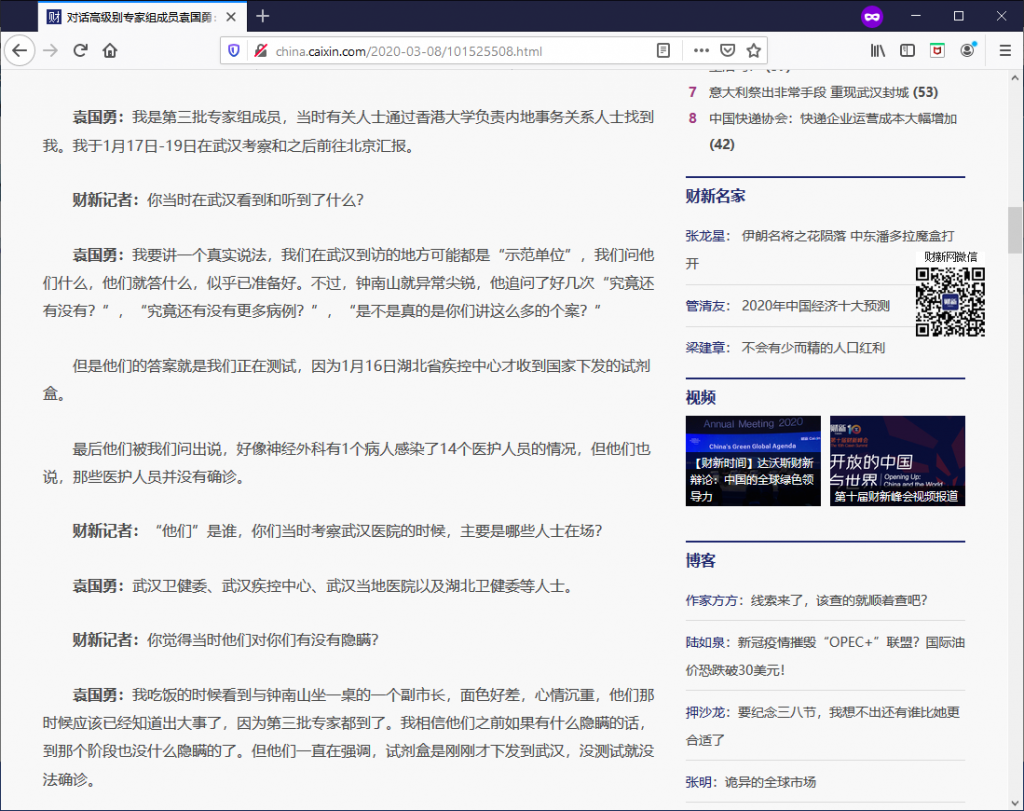Recently, Caixin reported two members of the National Health Commission’s high-level expert groups were sent to Wuhan spoke and indicated that Wuhan officials had hidden information during their visits.
The first expert remained anonymous and was a member of the second expert group. He said that they were particularly concerned if any medical staff had been infected because a “Yes” answer would mean the virus could transmit from person to person and could be highly contagious.
They asked about it at every hospital they visited and always got “No” as the answer. They suspected the result and asked hospitals to tell the truth.
A local Health Commission official countered back, “Do you think that I am lying to you?”
The expert said, “Based on the true situation (that we now know), he was lying.”
Caixin’s article was deleted. United Daily News, a media based in Taiwan covered Caixin’s report.
The second expert was Yuan Guoyong, a Professor at the Department of Microbiology, the University of Hong Kong. As a member of the third high-level expert group, he went to Wuhan from January 17 to January 19. He said in an interview with a Caixin reporter:
“I want to give a true account. The places that we visited in Wuhan were probably the ‘demo units.’ Whatever we asked, they gave an answer as if they had already prepared the answer. Zhong Nanshan kept asking ‘Are there more cases?’ ‘Are there truly just these many cases that you told us about?’
“They said that they were conducting testing to confirm cases. However, the Hubei Center for Disease Control and Prevention (CDC) did not receive testing kits until January 16.
“Under our questions, they said that there seemed to be a case in which a patient infected 14 medical staff members, but they said those medical personnel had not been confirmed to have the coronavirus infection yet.
“They are the people from the Wuhan Health Commission, Wuhan CDC, Wuhan local hospitals, and Hubei Provincial Health Commission.
“They kept emphasizing that the testing kits were just given to Wuhan and without the testing kits they could not have confirmed the cases.”
1. Excerpt in Chinese:
財經雜誌微信公眾號「財經E法」2月26日發布一則第二批專家組成員的專訪。這位不願具名的專家指出,他們當時掌握兩起家庭聚集性病例,但未能排除是因「共同暴露」所造成。而醫護人員和病人通常沒有密切接觸,因此只要醫護人員遭感染,一定是「人傳人」,而且病毒傳染性非常強。
所以,這位專家表示,專家組特別關心是否有醫護人員被傳染,每到一間醫院就問,但答案都是否定。他表示,當時專家組也懷疑這個說法,要對方如實報告,而當地衛健委的官員當場反問:「你們是不是覺得我瞞報啊?」
專家表示,當時收到的指示是「屬地管理,地方為主」,救治工作還是由湖北和武漢的專家組負責,國家衛健委的專家組只是協助。
而據媒體後來披露,當時已經有武漢的醫護人員遭感染,住院救治。這名專家說:「從現在的真實情況看來,他(官員)在說謊。」
這兩篇報導指出中國官方在防疫上存在延誤和隱匿,而報導在刊登不久後,也已陸續遭到刪除。
Source: United Daily News, February 29, 2020
https://udn.com/news/story/120936/4379889
2. Image of Caixin Report:

Source: Caixin, March 8, 2020
http://china.caixin.com/2020-03-08/101525508.html
